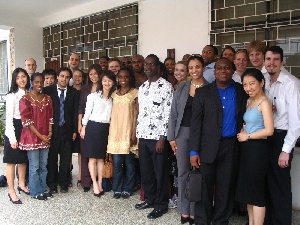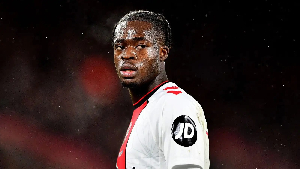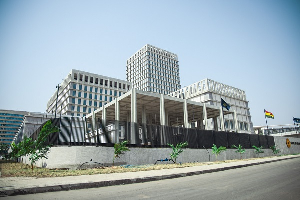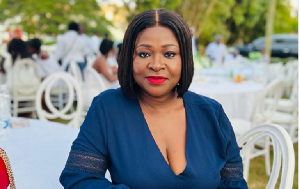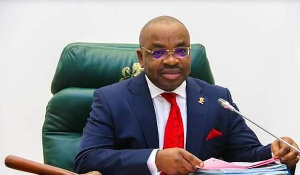I was filled with great anticipation as our flight touched down at Kotoka International Airport on March 18, 2007. I had been waiting for this moment for several weeks. Besides the spirit of Ghana’s 50 years of independence celebration that put me in a festive mood, there was another reason why my trip home this time was special. Twenty seven of my schoolmates from Harvard Business School had accompanied me to Ghana.
During the week that we planned to stay in Ghana, I hoped to show them around various cities including Accra, Cape Coast, Elmina and Kumasi. For some of my friends, this was their first trip outside the United States; for others it was their first visit to the African continent and so I was pleased that Ghana was going to be their gateway to the continent.
I was particularly excited about this trip because it would provide my friends an opportunity to experience Ghanaian culture and an understanding of our economy, politics and social life in a practical way. As we alighted from the plane, the hot air and arrival lounge draped in our colorful national flag welcomed us. Despite a delayed flight that resulted in some members of our group missing their luggage as our flight arrived in Accra, I was delighted to see the representatives from Land Tours who had arranged hotel accommodations and ground transportation for our group. We were transferred to the plush La Palm Hotel where we were to stay during our time in Accra. After some rest and lunch we started our tour of Accra.
As our bus meandered through the La and Osu streets I realized how well the city had been improved and beautified in celebration of the independence jubilee. After driving by Danquah Circle, the Independence Square, the National Theatre and other monuments, we visited the Kwame Nkrumah Mausoleum where a tour guide recounted the history of Dr. Nkrumah and his achievements. Our next stop was the Arts Center where the group saw various artwork and traditional attire and did some shopping. Given the nice artwork and the aggressive salespeople at the center, I was not surprised when many of us returned to the bus with various artwork and traditional clothing.
As the sun went down we made our way to my parent’s house for dinner. Unfortunately, the electricity in our neighborhood went out by the time we arrived but we still enjoyed a wonderful dinner as many of my colleagues got their first taste of home-cooked Ghanaian cuisine and local drinks. As we retired to our hotel later that evening, I was pleased with how our trip had started.
I dubbed our second day in Accra the “formal day.” I had arranged three major meetings to give the group an understanding of the economic, business and political climate of the country. After breakfast we proceeded to the Ministry of Economic Reform and met with Dr. Kwesi Nduom and Mrs. Rebecca Amoo-Aboagye who discussed various initiatives that the ministry has been working on. During a session of Q&A, Dr. Nduom explained the economic milestones that the country had achieved over the last few years including a stabilized currency, declining inflation, deregulated energy and several other private sector initiatives. I left that meeting with gross optimism about the economic future of the country given recent achievements and ongoing initiatives of the government. Next, we visited the Du Bois Center and then made our way to Ashesi University, a premier private university in Ghana, to meet with Mr. Patrick Awuah, the founder of the institution. As Mr. Awuah explained his “calling” to leave his lucrative career at Microsoft to pursue his mission of education in Ghana, his vision to reform tertiary education in Ghana greatly inspired us. The success of Ashesi means development of future Ghanaian leaders who can think out of the box and help take the country to the next level.
Our last meeting of the day was with representatives of Databank, Ghana’s premier investment bank, at their new office at Adabraka, Accra. Their world class posh facility was only the beginning sign of excellence. Mr. Keli Gadzekpo, Executive Vice Chairman & Co-Founder, and Mr. Yofi Grant, Executive Director, provided us an overview of the history, achievements and future plans of the firm. They also discussed the Ghanaian economy, business opportunities and interactions between the private and public sectors of the country. As we met several other representatives of Databank during refreshments after the company’s presentation, I could see how thrilled they were about how far the company has come and the future visionary path they were blazing. As we wound down with dinner and drinks at Home Touch that evening, I looked forward to our trip to Cape Coast the following day. When I visited Ghana about 15 months before this recent trip, the road from Accra to Cape Coast was under reconstruction and made the drive quite bumpy and longer than necessary. This time the reconstruction was almost complete and so the drive was very pleasant. Our tour guide from Land Tours explained social life in the fishing villages as we drove through the coastal savannah. We finally made our way to the Hans Cottage Botel for lunch where we enjoyed viewing the crocodiles in the pond upon which the restaurant was built. It was quite an experience for many of us to get that close to the crocodiles. After lunch, we visited the Cape Coast Castle where a tour guide led us through the historical site that was central to the trans-Atlantic slave trade. A somber walk through the dungeons and narrations from our tour guide reminded us of the atrocities that took place at the site several centuries ago. Most fitting is the plaque at the castle that admonished us never to allow such atrocities to be carried out against humanity again.
A trip to the Kakum National Park the following morning was a real adventure. I was really looking forward to the canopy walkway that has become the main attraction of the park. After the hike up to the canopy walkway and successfully overcoming the challenges it presented, I felt we were ready to take on Obuasi, which was our next stop. Most of us were looking forward to an opportunity to visit the Obuasi gold mine of Anglogold Ashanti. We had studied a case in school about the company and the mine, and this trip was an opportunity for us to understand the mining operations at Obuasi. Outfitted with mining gear of boots, overalls, helmets and other accessories, we followed our guides into the depths of the mine and learned a lot about the operations there. After the tour we made our way to Kumasi where we lodged for the night. The following day was earmarked for cultural sightseeing. We visited Bonwire to see kente weavers at work. Trips to other villages provided us opportunities to see how Adinkra print, carvings and other traditional artwork are made. We also managed to buy several artwork at bargain prices during the trips to those villages. The rest of our time in Kumasi was spent visiting the Manhyia Palace, the Okomfo Anokye sword site and the Kejetia market. It was interesting to see the contrasts and similarities between Kumasi and Accra. Many members of the group are intrigued by Ashanti culture and so our sightseeing in Kumasi and some of its nearby villages was a worthwhile adventure. We completed our visit to Kumasi and returned to Accra, our starting point, with plans to enjoy some of the entertainment and nightlife in the city. We began the evening with a play at the Drama School of the University of Ghana, Legon. The play about Yaa Asentewaa and the cultural encounters between the British and Ashantis was a great complement to our Kumasi trip. After the play, we visited a bar in town to enjoy the remaining hours we had left as it dawned on me that we had less than a day to spend in Ghana before returning to Boston. After a night’s rest, we woke up the following morning to enjoy our last day in Ghana. Most of us enjoyed the sun at the pool as we geared for the cold that awaited us in Boston. Others did some final shopping. In a few hours, we headed to the airport having completed a week’s visit to Ghana. Overall, I found our trip very meaningful. We had opportunities to explore Ghanaian culture (in both urban and rural areas), and to get perspectives on the economy, business and politics from experts in the country. I was impressed by the strides that the country has made since my last visit. There is still a lot that we must do to achieve our national goal of becoming a middle income country in the next few years. However, the dynamism, the entrepreneurial spirit, the forces of economic and political reform, and the optimism that permeates the atmosphere provide hope for a brighter and better Ghana.
Most of my colleagues returned to Boston with a very positive impression of the country and high expectations for Ghana’s future. For Ghana, it is an era of great expectations. Hopefully, those expectations will provide us the motivations to continue on the path of reform to improve living standards and to create prosperity for all Ghanaians.
Diaspora News of Monday, 16 April 2007
Source: Eric Nana Otoo (Final Year MBA Student, Harvard Business School, Boston)





